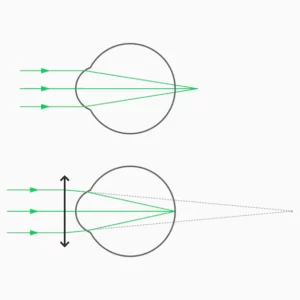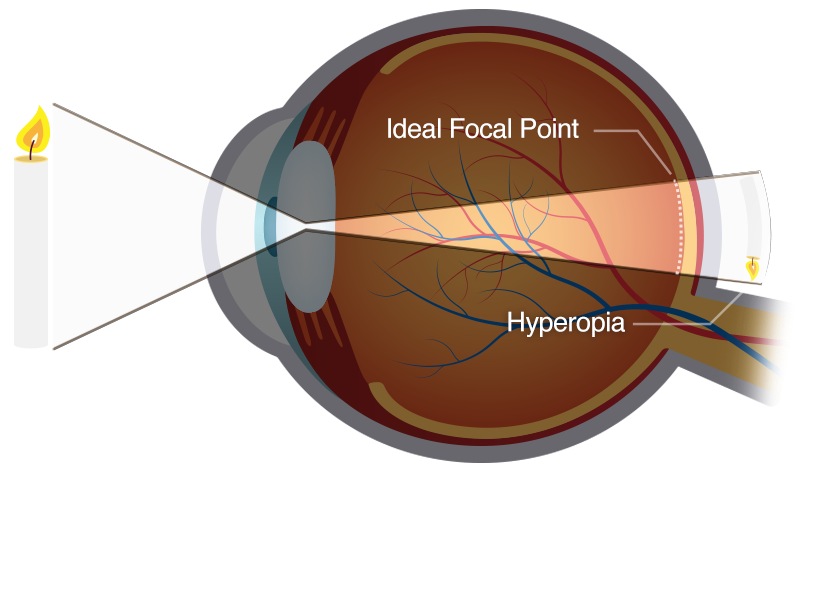If you have ever gone to the eye doctor and been told that you are hypermetropic, then you may be wondering what that means. In this blog post, we will discuss what is hypermetropia farsighted, its causes, and its symptoms. We will also provide you with some treatment options as well as prevention tips. So keep reading on!
Contents
What Is Hypermetropia Farsighted?
 Hypermetropia (also called farsightedness) is a common eye condition in which objects far away are seen more clearly than those that are near. It occurs when the eyeball is too short, or when the focusing power of the eye’s lens is too weak. This causes light from faraway objects to be focused behind the retina rather than directly on it, resulting in blurred near vision.
Hypermetropia (also called farsightedness) is a common eye condition in which objects far away are seen more clearly than those that are near. It occurs when the eyeball is too short, or when the focusing power of the eye’s lens is too weak. This causes light from faraway objects to be focused behind the retina rather than directly on it, resulting in blurred near vision.
It is estimated that nearly 25 percent of adults have some degree of hypermetropia farsighted, with the prevalence increasing with age. Hypermetropia is often inherited and can be present at birth or develop over time.
So, you should consult an ophthalmologist if you experience blurred near vision or difficulty focusing on objects close up, especially if symptoms become worse over time.
Is Hyperopia And Hypermetropia Same?
There has been always confusion between hyperopia and hypermetropia, but they are in fact the same. The term hypermetropia is more favored by European and Australian ophthalmologists while American ophthalmologists prefer to use the term hyperopia.
And for the more general term, farsightedness is used. However, all these words are used to describe the same condition which is also known as long-sightedness.
In fact, it is a common refractive error of the eyes. It occurs when light entering the eye is focused behind the retina instead of directly on it, causing blurred vision when viewing objects up close. In order to focus clearly, people with hypermetropia must strain their eyes more than normal and this can lead to fatigue and headaches.
All in all, if you are having difficulty seeing close-up objects, then you may be suffering from Hypermetropia farsightedness. So, do not forget to get your eyes checked by a qualified ophthalmologist. With proper treatment, you can manage this condition!
Symptoms Of Hypermetropia Farsighted
Hypermetropia farsightedness is a common vision condition that affects many people of all ages. People with this condition may experience blurred distance vision, and near vision can often be blurry as well. Other common symptoms of hypermetropia include:
- Difficulty focusing on objects at a distance: This is because the eye focuses light behind, rather than directly onto, the retina.
- Squinting: This is often done in an attempt to sharpen vision and focus on objects that are far away.
- Frequent headaches: These can occur due to straining of the eyes when trying to focus on distant objects.
- Feeling fatigued after reading: This can be caused by the eye needing to work harder than usual in order to focus properly.
- Decreased visual acuity: This is the ability to see clearly, and people with hypermetropia often have decreased visual acuity.
These are just a few of the common symptoms associated with hypermetropia. If you experience any of these, it’s important to consult an eye care professional for diagnosis and treatment. Also, you should keep in mind that the severity of your symptoms may vary from day to day, so it’s important to keep track of your vision and pay attention to any changes.
What Are The Possible Causes And Risks?
 Hypermetropia (farsightedness) is an eye condition that occurs when the eyeball is too short or the cornea is not curved enough. There could be several causes and risks associated with this condition. Some of these include:
Hypermetropia (farsightedness) is an eye condition that occurs when the eyeball is too short or the cornea is not curved enough. There could be several causes and risks associated with this condition. Some of these include:
- Genetics: It is possible that hypermetropia may be inherited, although the actual cause is not known. If someone in your family has it, you may also suffer from this condition.
- Eye Injury: Trauma or injury to the eye can cause hypermetropia, either temporarily or permanently.
- Aging Changes: As we age, our eyes tend to become less flexible, causing the eyeball to become shorter. This can lead to this condition.
- Prescription Glasses: Wearing glasses with an incorrect prescription can cause farsightedness. Always get your eyes checked and make sure you wear the correct lenses.
- Lifestyle: It is possible that certain lifestyle choices could put you at greater risk of developing this condition. Smoking, drinking alcohol, or eating unhealthy foods can all have a negative impact on your vision.
It is important to understand the causes and risks associated with this condition. So that you can take the necessary steps to prevent it. If you think that you might be suffering from hypermetropia, get it checked out with your doctor or an optometrist. Early diagnosis and treatment are key to preserving good vision and avoiding any potential complications in the future.
How Is It Diagnosed?
A diagnosis is always an essential part of any health treatment, and it is no different for hypermetropia. To diagnose this condition, a comprehensive eye exam will typically be conducted. This exam will involve testing the vision of both eyes individually and together to assess the person’s overall visual acuity.
An optometrist or ophthalmologist will also perform tests such as:
- Retinoscopy is a refraction test to determine the strength of the lens needed to correct your vision
- An eye muscle balance test
- Slit-lamp examination
All these tests will help to provide an accurate diagnosis and then allow corrective lenses or surgery to be offered if necessary. Only a qualified eye doctor should conduct these tests because it is essential to ensure that an accurate diagnosis is made.
How Can You Treat Hypermetropia Farsighted?
Hypermetropia farsightedness can be treated with eyeglasses, contact lenses, or refractive surgery. Let’s discuss all of these treatments in more detail!
Eyeglasses
Eyeglasses are a common way to correct farsightedness. The lenses of the eyeglasses make near objects appear clearer and can reduce your dependency on contacts or surgery. Prescription eyeglasses also reduce eye strain and fatigue, allowing you to focus better on close work.
Contact Lenses
For those who don’t wish to wear eyeglasses, contact lenses can be an alternative form of vision correction. Soft contact lenses are the most common type of contact used for farsightedness and can help reduce the effects of hypermetropia. Gas-permeable contact lenses are also sometimes used to correct farsightedness.
Refractive Surgery
Refractive surgery is a surgical option for correcting hypermetropia farsightedness. This type of surgery reshapes the cornea and can reduce or eliminate the need for corrective lenses. It’s important to keep in mind that refractive surgery carries certain risks and should not be taken lightly.
No matter which treatment you choose, it’s important to discuss your options with an optometrist or ophthalmologist to ensure that you get the best results possible. With the right care and follow-up, hypermetropia farsightedness can be successfully managed and treated!
The good news is that hypermetropia farsightedness can be managed and corrected. With the right treatments, you can get back to enjoying life with a clear vision!
Can It Be Prevented?
 While hypermetropia farsighted cannot be prevented. Because it is a condition that is caused by the shape of the eye, it is a permanent condition that cannot be prevented. But there are certain steps that can be taken to reduce its effects. These include:
While hypermetropia farsighted cannot be prevented. Because it is a condition that is caused by the shape of the eye, it is a permanent condition that cannot be prevented. But there are certain steps that can be taken to reduce its effects. These include:
- Healthy eating: What you eat goes a long way to affecting your vision. Eating foods that are rich in omega-3 fatty acids, as well as vitamins A and E will help keep your eyes in top shape.
- Proper rest: Getting enough sleep is essential for eye health. Not getting the right amount of sleep can lead to vision problems, including hypermetropia (farsightedness).
- Prescription glasses or contact lenses: If you experience symptoms of farsightedness, you should visit your optometrist and get a prescription for corrective lenses.
- Eye exercises: Eye exercises, such as palm, can help strengthen your eye muscles, reducing the strain that is often associated with farsightedness.
- Sun protection: Wearing sunglasses when you are outdoors will help protect your eyes from harmful UV rays that can cause damage over time.
- Quitting smoking: Smoking can have a damaging effect on your eyes, which can lead to vision problems, including farsightedness. If you smoke, quitting is the best way to protect your eyes.
By following these steps, you can keep your eye health in good condition and reduce the effects of farsightedness. It is important to remember, however, that if you have farsightedness, it cannot be reversed or cured. The best way to treat it is to manage its symptoms with the help of prescription lenses or contact lenses and regular eye exams.
Conclusion
In a nutshell, hypermetropia farsightedness is often the same and can be corrected with the help of glasses, contact lenses, and laser surgery. It is important to consult an eye specialist if you suspect that you might have this condition. Otherwise, it may lead to more serious vision problems such as amblyopia (lazy eye) or strabismus (squinting).
Opting for regular check-ups and getting the right corrective lenses can help correct farsightedness and maintain overall eye health. Taking proactive steps to ensure that your vision stays sharp is key to preventing further complications from developing.
However, for more information please contact Mantra Care. This platform offers the most advanced Lasik options. If you have any questions on lasik surgery feel free to reach out to us at +91-9711116605.
